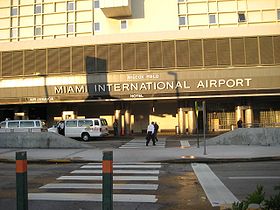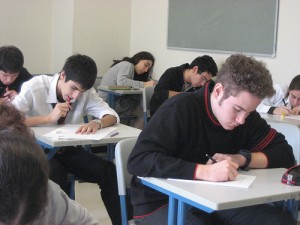Cuban Americans in the Airport
March 21, 2012 by admin
On the way down to Cuba we spent a lot of time sitting around in airports as our flights were delayed over and over. Though it seemed like the universe was conspiring to make it so that we would never get to Havana, the airport (Miami, not LaGuardia) proved to be a place of insightful discussion.
Many of the workers in the Miami International Airport are Cuban Americans. I had certainly heard a lot about the views of Cuban Americans toward Cuba and toward the Revolution from my readings. Having fled Cuba, they predictably don’t approve much of its political or economic systems. Most come to the United States with the goal of creating a better life, one less controlled by the state and one with the potential for them to advance economically. This was my perception of Cuban Americans before getting to Miami, and I was surprised to find out that what I had learned was largely a reality.
I spoke to three men working in the airport as bag wrappers: Hector, Pablo, and Frank. They were extremely interested in the fact that we were studying Cuba and that we would be going there in a few hours (if the plane was ever going to actually take off). The three were very different but definitely espoused that anti-Cuban sentiment I had heard about.
Hector was definitely the least political and had been in the US for three years. He told us about all the places we should visit in Havana and described in detail the area where we would be staying, including the Plaza de la Revolución. it was really exciting when we did actually get to see those things. Though he still had children in Cuba (who he assumingly sent remittances to), it didn’t seem like he was overwhelmed by grievances toward the state.
If Hector didn’t speak strongly against Cuba, Pablo did enough for the two of them. He had been in the US for six years and was adamant in his disapproval of Cuba. He told me that just by travelling there I would never be able to know Cuba because I was born with freedom and so couldn’t possibly understand what it is like not to have it. he said I should leave all of my things, all of my money in the airport and go live and work like a real Cuban if I wanted to know what it was like. Pablo also insisted that everyone in Cuba has a political opinion, everyone questions the state. He was overall very…intense, and gave me the general vision that Cuban society was secretly and subtly oppressive and that I should be skeptical of what state officials and tourist agencies told me about the country. Though he intimidated me, I wondered how much of what he was saying was true.
The last was Frank who had been in the US a few weeks short of one year. He also had strong opinions about Cuba and socialism in general, but was less intense about it. He gave us an interesting comparison to ponder: In a classroom, everyone is given the same grade (the class average) on every test. The first test most of the class studies and everyone receives the same grade. Noticing that everyone gets the same grade regardless, for the next test less people study. Even less study for the next test and it continues until finally no one is studying and the class average is unacceptably low. This, Frank said, was what is occurring in Cuba. It was also for this reason that he liked the capitalist system better: everyone gets what they work for (in theory anyway, I would add). He was making more money wrapping people’s luggage in cellophane at the airport than he ever made as an engineer in Cuba.
It was hard for me to argue with their logic, having never been to Cuba. Now, having gone, I still am not sure what I’d say. Socialism has its flaws, yes, but I’ve spent the last few years (and several lengthy papers) analyzing the flaws of capitalism and am completely unwilling to accept that it is the better system. Perhaps I really do not “know” Cuba as Pablo said I can’t, but I don’t believe any more that he knows the United States and understands the downsides of capitalism. I personally can’t argue that a system involving free education and healthcare, equality, and an inherent respect for all people is bad. It actually sounds pretty great to me. I’m really glad I got to talk to these three men; it was certainly an interesting way to begin my experience exploring Cuba.
Leave a Reply
You must be logged in to post a comment.


